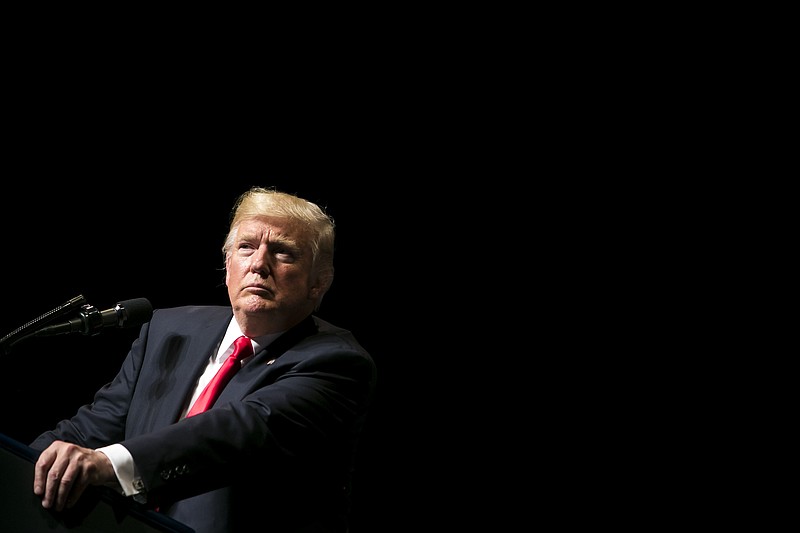It's old news to us now: That Russians meddled in America's 2016 presidential election. Yet it grows more pertinent every day.
Seventeen intelligence agencies concluded that hackers with ties to Russian intelligence services rummaged through Democratic Party computer networks and some Republican systems for more than a year. In July, the FBI had opened an investigation of contacts between Russian officials and Trump associates. And on July 22, nearly 20,000 emails stolen from the Democratic National Committee were dumped online by WikiLeaks.
Then in early August, the CIA told then-President Barack Obama and three senior aides that Russian President Vladimir Putin had direct involvement in a cyber-campaign to discredit the presidential race - to damage the Democratic nominee Hillary Clinton and help elect her Republican opponent, Donald Trump.
It worked even better than the Russians imagined.
And better than Obama and his administration expected, according to an exclusive, recent story in The Washington Post.
Clinton held a lead in the polls. Obama in all things was cautious and deliberative. He ordered a full-steam-ahead intelligence collection, and fell back to what the Post characterized as the oft-assumed single imperative: Don't make things worse. Obama and his advisers were concerned that any pre-election response could provoke an escalation from Putin, perhaps a cyber-assault on voting systems before and on Election Day. They also worried that any action they took would be perceived as political interference. After all, Trump was already predicting the election would be "rigged."
The Post writes: "Obama officials feared providing fuel to such claims, playing into Russia's efforts to discredit the outcome and potentially contaminating the expected Clinton triumph."
Ah, hindsight.
Did Obama do enough? Yes and No. We suspect he will say the same one day.
But to say he did "nothing," as Russian action beneficiary Donald Trump has, is ludicrous.
A better question is what has Trump done?
Obama expelled Russian diplomats, seized two compounds, introduced sanctions and set more sanctions for the Trump administration to trigger.
Trump's former National Security Adviser Michael Flynn - even before he and Trump were in office - began telling Russian envoys not to worry about those sanctions. Last month, the Trump administration moved to return those compounds to the Russians.
Obama also went to the leaders of Congress and asked for bipartisan help to let Americans know about the meddling.
Senate Majority Leader Mitch McConnell was dismissive, saying he doubted the information. He further told the administration he would consider any White House effort to challenge the Russians publicly an act of partisan politics, according to the Post.
As evidence mounted against Flynn, who was fired for lying to Vice President Mike Pence about the sanctions conversations with the Russians, Trump suggested that then-FBI Director James Comey give Flynn a pass.
And as more evidence of Russian ties piled up against Flynn and other Trump associates, Trump fired Comey.
What about those "trigger" sanctions Obama left for Trump to employ? They remain untriggered.
Meanwhile, as Trump continued praising Putin, calling the meddling "fake news" and "a hoax" and making more noises about easing sanctions, the Senate in bipartisan fashion approved a bill establishing a review process for Congress on White House autonomy to ease Russian sanctions over interference on Moscow's aggression in Ukraine and Syria. The bill, which passed on an astonishing 98-2 vote, also establishes new sanctions against those conducting cyber-attacks on behalf of the Russian government.
"We moved to make the Congress, not the President, the final arbiter of sanctions relief when necessary," Senate Minority Leader Chuck Schumer, D-N.Y., said. "Any idea of the President that he can lift sanctions on his own for whatever reason are dashed by this legislation."
The Trump administration is now reportedly lobbying the House of Representatives not to pass a companion measure.
And now today, what do we have from the White House? An odd, late-night Monday White House release about Syrian President Bashar al-Assad planning to use chemical weapons again and a vague White House threat that "his military will pay a heavy price." The Syrian government denies it's readying such an assault. The Trump administration says that means the public rather than diplomatic message is working.
Sadly, the Trump White House has ceded away the credibility we should have in our president, so this comes across as just another move from the Trump distraction 101 textbook.
So, let's ask our question a different way: In his 159 days in office, what has Trump done to stop Russian meddling in our elections and democracy?
It would be easy - but incorrect - to say "nothing."
The reality is that Trump and his administration - as well as Mitch McConnell with his early roadblock to public discussion - have done everything possible to give the Russians an open and unimpeded road into our votes, our internet, our White House and our country.
